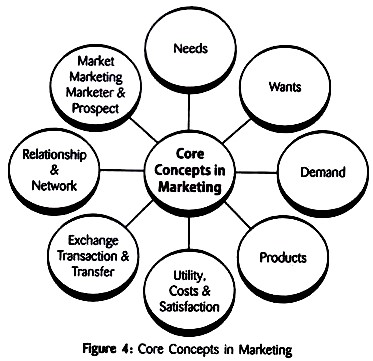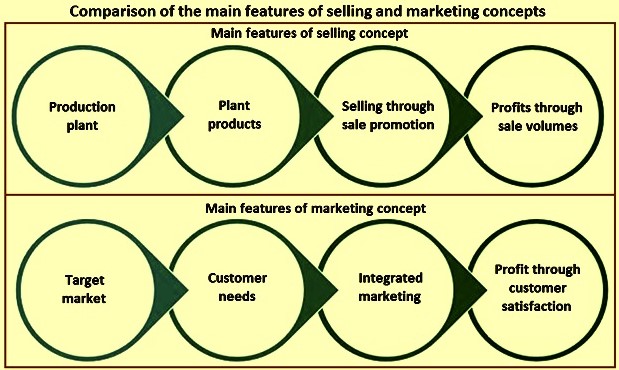The marketing landscape is dotted with various concepts that guide businesses in their quest to connect with customers. Among these, the selling and marketing concepts stand out as fundamental approaches, each with its own set of strategies and goals. While seemingly similar at first glance, these concepts differ significantly in how they perceive and interact with the market.
The difference between the selling concept and the marketing concept lies primarily in their core objectives and methodologies. The selling concept focuses on driving sales through aggressive advertising and promotion, operating under the assumption that a product will only sell if pushed onto consumers. In contrast, the marketing concept revolves around understanding and satisfying customer needs, believing that sales are a natural outcome of effective market orientation and customer engagement.
This distinction highlights a shift from a product-centric to a customer-centric approach in business strategies. While the selling concept aims to maximize sales of what the company makes, the marketing concept emphasizes creating products and services that the market wants. This fundamental shift underscores the evolution of business philosophy from merely selling to creating value, thereby fostering long-term relationships with customers.

Core Concepts Defined
Selling Concept
Definition and Focus
The selling concept operates on the principle that products will not sell by themselves and must be pushed through aggressive marketing and sales tactics. This approach is typically adopted by companies with a focus on sales transactions rather than on building long-term customer relationships. The primary focus here is on creating sales transactions rather than on what the customer actually needs or wants.
Key Characteristics
- Product-Centric: The selling concept is inherently product-centric. It prioritizes the company’s needs to sell its existing products over the needs or wants of the market.
- High-Pressure Sales: This concept relies heavily on high-pressure sales techniques. Sales teams are encouraged to persuade customers to buy, regardless of the customers’ initial interest or need.
- Short-Term Orientation: The goal is often short-term sales targets rather than long-term customer satisfaction. Success is measured by immediate sales results, not by long-term brand loyalty or customer relationships.
- Mass Marketing: The selling concept frequently employs mass marketing strategies to reach as wide an audience as possible, often with little segmentation or targeting.
Marketing Concept
Definition and Approach
In contrast, the marketing concept focuses on identifying and meeting the needs and wants of customers. It is a customer-centric approach that looks at marketing as a way of satisfying customer needs, with the belief that this will lead to sales and long-term business success. The marketing concept starts with the market and then works backward to create products and services that fulfill the market’s needs.
Core Principles
- Customer Focus: The core of the marketing concept is the focus on understanding and meeting the needs of the customer. This involves research, feedback, and adaptation to changing customer preferences.
- Integrated Marketing: This principle emphasizes that all aspects of marketing (product, price, place, promotion) should work together cohesively to serve customer needs.
- Long-Term Relationships: The marketing concept values the development of long-term relationships with customers, believing that customer loyalty is key to sustained business success.
- Value Creation: Beyond simply selling products, the marketing concept focuses on creating value for the customer, which can lead to higher customer satisfaction and loyalty.
Historical Evolution
Origin of Selling Concept
Early Business Strategies
The selling concept has its roots in the early industrial age, a time when the focus was on production and manufacturing. Companies operated under the assumption that a good product would sell itself, and the main challenge was producing enough to meet demand. However, as production capabilities expanded, the market became saturated with goods, leading to the need for more aggressive sales tactics.
Shifts in Consumer Behavior
As markets became more crowded and competition intensified, businesses began to notice shifts in consumer behavior. Customers had more choices and were no longer satisfied with just any product; they wanted goods that met their specific needs and preferences. This shift marked the beginning of the decline of the selling concept as businesses started to realize that simply pushing products was not enough to guarantee success.
Emergence of Marketing Concept
Response to Market Changes
The marketing concept emerged as a response to the limitations of the selling concept and the changing market dynamics. Businesses recognized the importance of understanding the customer and aligning their products and services with the needs of the market. This marked a significant shift from product-centric to customer-centric strategies.
Evolution of Consumer-Centric Approaches
The evolution of the marketing concept has been characterized by an increasing emphasis on research, market segmentation, and targeting specific customer groups. Advances in technology have further enabled businesses to gather detailed insights into customer behavior, preferences, and expectations, leading to more personalized and effective marketing strategies. Today, the marketing concept is seen as essential for creating value, building strong customer relationships, and achieving long-term business success.
Key Differences
Objective Focus
Selling: Sales Volume Increase
The primary goal of the selling concept is to maximize sales volume. Businesses operating under this model put immense pressure on marketing and sales teams to push products, often without considering the actual needs or preferences of the customer. The belief is that success is measured by the number of units sold, not by customer satisfaction or loyalty.
Marketing: Customer Satisfaction and Loyalty
Conversely, the marketing concept prioritizes customer satisfaction and loyalty above mere sales figures. This approach understands that satisfied customers are more likely to make repeat purchases and recommend the business to others, driving both sales and sustained business growth organically.
Strategies Employed
Selling: Aggressive Advertising and Promotion
Under the selling concept, strategies involve aggressive advertising and promotion tactics. The aim is to create a compelling message that convinces consumers to buy, even if they have no pre-existing desire or need for the product.
Marketing: Research and Understanding Customer Needs
The marketing concept, however, employs strategies focused on research and understanding customer needs. Marketing efforts are tailored to communicate how products and services meet those needs, creating a value proposition that resonates with the target audience.
Outcome Orientation
Selling: Short-term Goals
The selling concept is all about achieving short-term goals, with a particular emphasis on immediate sales. This short-sighted approach often neglects the potential for building lasting customer relationships.
Marketing: Long-term Relationships
The marketing concept is oriented towards long-term relationships. Success is not just about the initial sale but about fostering a loyal customer base that will continue to support the business over time.
Implementation in Business
Selling Concept in Action
Typical Scenarios and Industries
The selling concept finds its application primarily in industries where products are hard to differentiate and competition is based on price or availability. Examples include generic household goods and basic consumer electronics.
Advantages and Limitations
- Advantages: Quick sales boosts and effective for moving unsold inventory.
- Limitations: Can lead to brand damage, customer dissatisfaction, and a focus on short-term gains over long-term sustainability.
Marketing Concept Applied
Success Stories
Businesses that have embraced the marketing concept often see remarkable success. Companies like Apple and Zappos have built their brand around understanding and fulfilling customer needs, leading to high levels of customer loyalty and brand advocacy.
Challenges and Considerations
- Challenges: Requires ongoing investment in market research and customer relationship management.
- Considerations: Must stay responsive to changing customer preferences and market dynamics.
Impact on Consumer Behavior
Perception and Preferences
How Each Concept Shapes Consumer Views
The selling concept can lead to a perception of the brand as pushy or insensitive to customer needs, while the marketing concept tends to enhance the brand’s image as caring and customer-focused.
Influence on Purchasing Decisions
Marketing that aligns with the customer’s values and needs is more likely to influence purchasing decisions positively, encouraging customers to choose products that genuinely appeal to them.
Relationship with Brands
Loyalty and Trust Development
The marketing concept fosters loyalty and trust, with customers more likely to return to brands that they feel understand their needs and provide value.
Impact of Social Media and Digital Marketing
Social media and digital marketing have amplified the importance of customer relationships. Brands that engage effectively with their audience online can enhance loyalty and trust significantly.
Future Trends
Shifts Towards Digital
The Role of Technology in Selling and Marketing
Technology plays a crucial role in both selling and marketing, with digital platforms offering new ways to reach and engage customers. The effectiveness of marketing campaigns now relies heavily on data analysis and online customer interactions.
Digital Marketing Strategies
Effective digital marketing strategies include content marketing, SEO, social media engagement, and personalized email campaigns. These methods allow for a more nuanced understanding of customer needs and more targeted marketing efforts.
Sustainability and Ethics
Incorporating Ethical Practices
Modern consumers increasingly expect businesses to operate ethically and sustainably. The marketing concept aligns well with this expectation, as it focuses on long-term relationships and can incorporate sustainable practices as part of its value proposition.
Consumer Expectations for Corporate Responsibility
Consumers now often evaluate companies based on their social and environmental impact. Businesses that can demonstrate a commitment to ethical practices are more likely to build trust and loyalty with their customer base.
Frequently Asked Questions
What is the Selling Concept?
The selling concept is a business philosophy that emphasizes aggressive sales techniques and promotional activities to push products onto customers, regardless of their actual needs or desires. It operates under the premise that customers would not buy enough of the company’s products without a substantial push from the seller, making sales volume the primary focus.
How Does the Marketing Concept Differ?
The marketing concept takes a customer-centric approach, focusing on identifying and meeting the needs and wants of target markets more effectively than competitors. It seeks to understand the customer’s perspective and bases product development, pricing, distribution, and promotional strategies on satisfying customer needs, leading to longer-term relationships and sustained success.
Why is Understanding These Concepts Important for Businesses?
Understanding these concepts is crucial for businesses because it influences their strategic planning, product development, and market engagement. Choosing between a selling or marketing orientation can significantly impact how a company interacts with its customer base, invests in product development, and positions itself in competitive markets. Aligning with the right concept can lead to sustainable growth and profitability.
Conclusion
The distinction between the selling concept and the marketing concept is more than academic; it represents a fundamental choice about how a business views its relationship with its customers. In today’s increasingly customer-centric market landscape, understanding and aligning with these concepts can mean the difference between short-term gains and long-term success.
Adopting the marketing concept offers a path toward sustainable growth through deep customer relationships, while the selling concept may provide quicker, albeit potentially less sustainable, sales achievements. As businesses navigate the complexities of modern markets, choosing the right conceptual foundation is essential for crafting strategies that are not only effective but also resonant with the values and needs of their customers.


Why would a marketing manager go for selling concept over marketing concept?